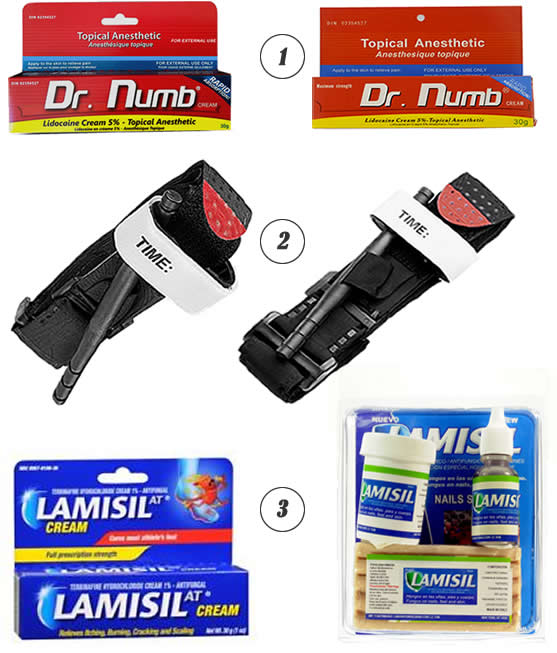FDA Turns A Blind Eye To E-commerce OTC Drugs
E-commerce sites profit, but online purchases may prove deadly.
August 14, 2018, Los Angeles, CA – The U.S. Food and Drug Administration (FDA) is supposed to police counterfeit and fraudulent medical devices and OTC drugs, but some e-commerce items are getting a blatant pass on enforcement.
Amazon (AMZN), eBay (EBAY) and Walmart (WMT) all sell unapproved medical devices and counterfeit OTC drugs. A mistake by consumers identifying counterfeit OTC drugs and medical devices could be deadly.
If you don't know much about the FDA, then you probably think that seeing a label like "FDA Approved" means that what you're using is generally safe and/or healthy. Tragically, counterfeit OTC drugs and medical devices that bear the label not only can injure or kill the purchaser, but unknowing third-parties. For example; a counterfeit Dr. Numb® Lidocaine product did not contain Lidocaine as indicated, but Tetracaine, an anesthetic known to cause fatal defects in animal testing, and can result in "full blown anaphylactic shock" says Surgeon and Anesthesiologist, Dr. Tom Brock. Counterfeit tourniquets have catastrophically failed during actual life-saving emergencies.
Can you identify the counterfeit, fake or replica product in each product pairing below? (answers at the bottom of page)

Photo: ©The Counterfeit Report
The Counterfeit Report sends infringement notices, authorized by the right holder or manufacturer, for removal of the counterfeit items from the e-commerce giant's websites. Alarmingly, while individual listings may be removed, the counterfeit items still remain, and sellers often relist the counterfeit items.
After a year of telephone calls and email communications with an FDA Special Agent and attorney, counterfeit, fake and replica devices and OTC drugs remain on all three websites.
The Counterfeit Report also notified each websites general counsel or legal department of the potentially fatal products;
The FDA is lagging behind yet again when it comes to banning things that are bad for people. Buyers should be very wary of purchasing any OTC drug or medical device online unless it comes directly from the manufacturer or authorized retailer. Counterfeiters and dishonest sellers are very good at creating visually deceptive products, packaging, holograms, certification labels and documentation that easily deceive consumers.
Companies that enable and facilitate criminal activity and profit from dishonest sales which impact consumer safety, jobs and public trust create a public perception of deception and impunity. The consequence is destroyed U.S. companies and retailers, lost U.S. jobs and duped consumers. The value of counterfeit and pirated goods is forecast to grow to $2.8 trillion, and cost 5.4 million net job losses by 2022 states a 2017 International Chamber of Commerce Report. Counterfeiting is now the world's largest criminal enterprise.
Answers - Counterfeit Product Identification: All the products on the left side in the product pairings are authentic.
Footnote:
21 US Code §321 (g)(1)
The term “drug” means (A) articles recognized in the official United States Pharmacopoeia, official Homeopathic Pharmacopoeia of the United States, or official National Formulary, or any supplement to any of them; and (B) articles intended for use in the diagnosis, cure, mitigation, treatment, or prevention of disease in man or other animals; and (C) articles (other than food) intended to affect the structure or any function of the body of man or other animals; and (D) articles intended for use as a component of any article specified in clause (A), (B), or (C). A food or dietary supplement for which a claim, subject to sections 343(r)(1)(B) and of this title or sections 343(r)(1)(B) and 343(r)(5)(D) of this title, is made in accordance with the requirements of section 343(r) of this title is not a drug solely because the label or the labeling contains such a claim. A food, dietary ingredient, or dietary supplement for which a truthful and not misleading statement is made in accordance with section 343(r)(6) of this title is not a drug under clause (C) solely because the label or the labeling contains such a statement.
The term “counterfeit drug” means a drug which, or the container or labeling of which, without authorization, bears the trademark, trade name, or other identifying mark, imprint, or device, or any likeness thereof, of a drug manufacturer, processor, packer, or distributor other than the person or persons who in fact manufactured, processed, packed, or distributed such drug and which thereby falsely purports or is represented to be the product of, or to have been packed or distributed by, such other drug manufacturer, processor, packer, or distributor.
 |